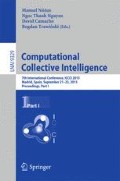Abstract
During last decades, the world has experienced a large number of economic crises, which were not confined to an individual economy, but affected directly, or in-directly almost every country all over the world. As a result, a number of international organizations, governments, and private sector institutions have begun to develop an early warning system as a monitoring system to detect the possibility of occurrence of an economic crisis in advance and to alert its users to take preventive actions. However, each of the systems addresses just one selected branch of economy, or particular spheres of company operation, and only a limited and small group of users apply them. Therefore this paper focuses on developing a conception of a model of a multiagent early warning system for crisis situations in economy. The system will include all branches of economy, and it may be used by any group of users. It will have the ability to predict unfavorable economic situations at a local, scattered, and integral level.
Access this chapter
Tax calculation will be finalised at checkout
Purchases are for personal use only
Preview
Unable to display preview. Download preview PDF.
References
Barrick, M.R., Stewart, G.R., Neubert, M.J., Mount, M.K.: Relating Member Ability and Personality to Work-Team Processes and Team Effectiveness. Journal of Applied. Psychology 83(3), 377–391 (1998)
Berg, A., Pattillo, C.: Predicting currency crises: The indicators approach and analternative. J. Int. Money Financ. 18, 561–586 (1999)
Candelon, B., Dumitrescu, E., Hurlin, C.: How to Evaluate an Early-Warning System: Toward a Unified Statistical Framework for Assessing Financial Crises Forecasting Methods. IMF Economic Review 60(1), 75–113 (2012)
Duong, T.H., Nguyen, N.T., Jo, G.-S.: A method for integration of wordnet-based ontologies using distance measures. In: Lovrek, I., Howlett, R.J., Jain, L.C. (eds.) KES 2008, Part I. LNCS (LNAI), vol. 5177, pp. 210–219. Springer, Heidelberg (2008)
Hackman, R.J.: The interaction of task design and group performance strategies in determining group effectiveness. Organizational Behavior and Human Performance 16(2), 350–365 (1976)
Jennings, N.R., Moreau, L., Nicholson, D., Ramchurn, S., Roberts, S., Rodden, T., Rogers, A.: Human-Agent Collectives. Communications of the ACM 57(12) (2014)
Kim, D.H., Lee, S.J., Oh, K.J., Kim, T.Y.: An early warning system for financial crisis using a stock market instability index: Expert system. J. Knowl. Eng. 26(3), 260–273 (2009)
Korol, T.: Early warning models against bankruptcy risk for Central European and Latin American enterprises. Economic Modelling 31, 22–30 (2013)
Lin, C., Khan, H.A., Chang, R., Wang, Y.: A new approach to modeling early warning systems for currency crises: Can a machine-learning fuzzy expert system predict the currency crises effectively? Journal of International Money and Finance 27(7), 1098–1121 (2008)
Mitra, S., Erum: Early warning prediction system for high inflation: an elitist neuro-genetic network model for the Indian economy. Neural Comp. and Appli. 22(1) (2012)
Nguyen N.T.: Advanced Methods for Inconsistent Knowledge Management. Springer-Verlag London (2008)
Sliwko, L., Nguyen, N.T.: Using Multi-agent Systems and Consensus Methods for Information Retrieval in Internet. International Journal of Intelligent Information and Database Systems 1(2), 181–198 (2007)
Snaider, J., McCall, R., Franklin, S.: The LIDA framework as a general tool for AGI. In: Schmidhuber, J., Thórisson, K.R., Looks, M. (eds.) AGI 2011. LNCS, vol. 6830, pp. 133–142. Springer, Heidelberg (2011)
Tziner, A., Eden, D.: Effects of Crew Composition on Crew Performance: Does the Whole Equal the Sum of Its Parts? Journal of Applied Psychology 70(1), 85–93 (1985)
Wiltshire, A.: Developing early warning systems: a checklist. In: Proceedings of the 3rd International Conference on Early Warning EWC III, Bonn (2006)
Woolley, A.W., Chabris, C.F., Pentland, A., Hashmi, N., Malone, T.: Evidence for a Collective Intelligence Factor in the Performance of Human Groups. Science 330(6004), 686–688 (2010)
Author information
Authors and Affiliations
Corresponding author
Editor information
Editors and Affiliations
Rights and permissions
Copyright information
© 2015 Springer International Publishing Switzerland
About this paper
Cite this paper
Hernes, M., Maleszka, M., Nguyen, N.T., Bytniewski, A. (2015). A Model of a Multiagent Early Warning System for Crisis Situations in Economy. In: Núñez, M., Nguyen, N., Camacho, D., Trawiński, B. (eds) Computational Collective Intelligence. Lecture Notes in Computer Science(), vol 9329. Springer, Cham. https://doi.org/10.1007/978-3-319-24069-5_5
Download citation
DOI: https://doi.org/10.1007/978-3-319-24069-5_5
Published:
Publisher Name: Springer, Cham
Print ISBN: 978-3-319-24068-8
Online ISBN: 978-3-319-24069-5
eBook Packages: Computer ScienceComputer Science (R0)

